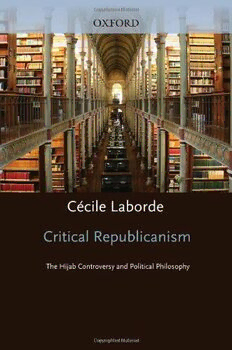
Critical Republicanism: The Hijab Controversy and Political Philosophy (Oxford Political Theory) PDF
396 Pages·2008·1.699 MB·English
Most books are stored in the elastic cloud where traffic is expensive. For this reason, we have a limit on daily download.
Preview Critical Republicanism: The Hijab Controversy and Political Philosophy (Oxford Political Theory)
Description:
The first comprehensive analysis of the philosophical issues raised by the hijab controversy in France, this book also conducts a dialogue between contemporary Anglo-American and French political theory and defends a progressive republican solution to so-called multicultural conflicts in contemporary societies. It critically assesses the official republican philosophy of laïcité which purported to justify the 2004 ban on religious signs in schools. Laïcité is shown to encompass a comprehensive theory of republican citizenship, centered on three ideals: equality (secular neutrality of the public sphere), liberty (individual autonomy and emancipation) and fraternity (civic loyalty to the community of citizens). Challenging official interpretations of laïcité, the book then puts forward a critical republicanism which does not support the hijab ban, yet upholds a revised interpretation of three central republican commitments: secularism, non-domination and civic solidarity. Thus, it articulates a version of secularism which squarely addresses the problem of status quo bias--the fact that Western societies are historically not neutral towards all religions. It also defends a vision of female emancipation which rejects the coercive paternalism inherent in the regulation of religious dress, yet does not leave individuals unaided in the face of religious and secular, patriarchal and ethnocentric domination. Finally, the book outlines a theory of immigrant integration which places the burden of civic integration on basic socio-political institutions, rather than on citizens themselves. Critical republicanism proposes an entirely new approach to the management of religious and cultural pluralism, centerd on the pursuit of the progressive ideal of non-domination in existing, non-ideal societies. Oxford Political Theory presents the best new work in contemporary political theory. It is intended to be broad in scope, including original contributions to political philosophy, and also work in applied political theory. The series will contain works of outstanding quality with no restriction as to approach or subject matter. Series Editors: Will Kymlicka, David Miller, and Alan Ryan.
See more
The list of books you might like
Most books are stored in the elastic cloud where traffic is expensive. For this reason, we have a limit on daily download.
